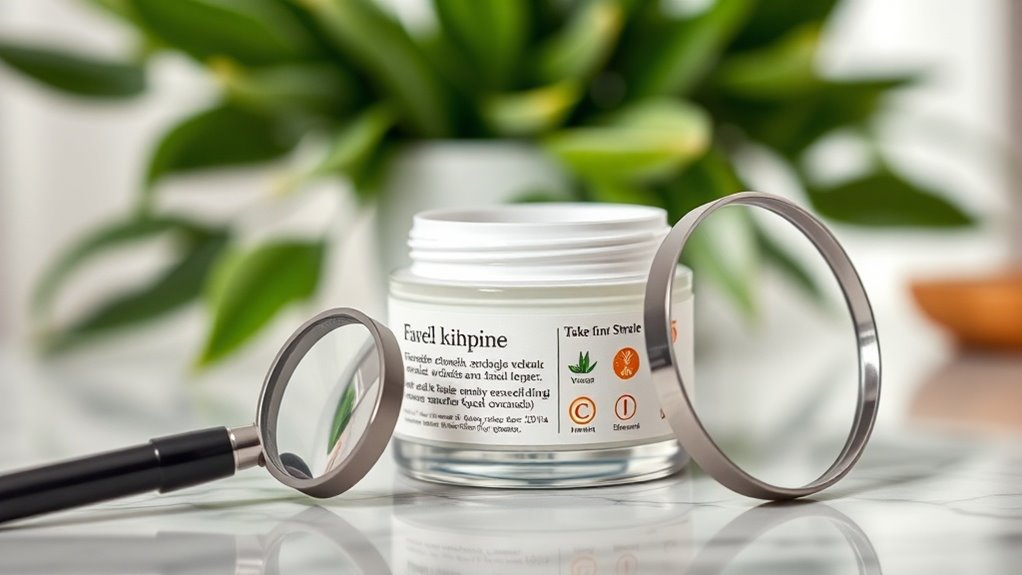Natural vs. Synthetic- Which Ingredients Win for Your Skin.
When it comes to skincare, choosing between natural and synthetic ingredients can be challenging. Each category has its strengths and weaknesses, impacting your skin differently based on your unique needs. Natural ingredients might offer purity, while synthetic options often deliver consistent results backed by research. The key is understanding how these choices affect your skin type and sensitivities. So, how do you determine which ingredients truly benefit you? Let’s explore further.
Key Takeaways
- Natural ingredients offer hydration and nourishment but can cause allergies or irritation for some individuals.
- Synthetic ingredients provide targeted benefits with consistent results, supported by rigorous safety testing.
- Effectiveness varies based on formulation and skin type, not solely on whether ingredients are natural or synthetic.
- Both natural and synthetic ingredients can have environmental impacts; sourcing practices should prioritize sustainability.
- Patch testing is essential for both types to identify potential sensitivities and optimize skincare routines.
Understanding Natural Ingredients
Natural ingredients in skincare are derived from plants, minerals, and other organic sources, offering a range of benefits for your skin.
When you conduct an ingredient comparison, you’ll find that natural components like aloe vera, shea butter, and essential oils provide hydration, nourishment, and soothing properties.
These ingredients often contain antioxidants and vitamins that promote skin health.
Additionally, they’re less likely to cause irritation or allergic reactions compared to synthetic alternatives.
Understanding the source and function of these natural ingredients can help you make informed choices, ensuring your skincare routine aligns with your skin’s specific needs and sensitivities. Furthermore, many natural ingredients boast science-backed benefits that can enhance their effectiveness in your skincare regimen.
The Benefits of Synthetic Ingredients
Synthetic ingredients in skincare often offer targeted and consistent results that can enhance your regimen. They’re designed to replicate or improve upon natural compounds, providing specific benefits like hydration, anti-aging, or acne treatment. Additionally, synthetic formulations can guarantee stability and longer shelf life, reducing waste and enhancing efficacy. Moreover, chemical skincare products are often rigorously tested for safety and effectiveness before reaching consumers.
| Benefit | Example Ingredient | Effect |
|---|---|---|
| Hydration | Hyaluronic Acid | Retains moisture |
| Anti-Aging | Retinoids | Boosts cell turnover |
| Acne Treatment | Salicylic Acid | Unclogs pores |
Embracing synthetic ingredients can optimize your skincare routine effectively.
Common Myths About Natural and Synthetic Skincare
You might believe that natural ingredients are always superior and that synthetic ones are inherently harmful.
However, these assumptions often overlook the complexities of skincare formulations and the scientific evidence supporting many synthetic options.
Let’s clarify these misconceptions and explore the facts behind natural and synthetic ingredients. Additionally, it’s worth noting that many expensive products touting trendy ingredients may not provide the benefits they claim, leading to wasted money and effort in your skincare routine.
Natural Is Always Better
Often, the belief that natural ingredients are inherently superior to synthetic ones oversimplifies the complexities of skincare formulations.
While many natural ingredients offer benefits, they can also cause allergic reactions or irritation in some individuals.
Conversely, synthetic ingredients are meticulously crafted to enhance stability and efficacy, providing targeted results.
Furthermore, synthetic compounds can mimic natural substances, delivering similar or even superior benefits without the variability often found in natural sources.
Ultimately, the effectiveness of a skincare product depends on its formulation and your unique skin type, not solely on whether the ingredients are natural or synthetic.
Synthetics Are Harmful Always
Many people mistakenly believe that all synthetic ingredients are harmful, leading to a widespread distrust of products containing them.
In reality, many synthetic ingredients are rigorously tested for safety and efficacy.
For instance, substances like hyaluronic acid and peptides, vital for hydration and skin repair, are often synthesized in laboratories to guarantee purity and consistency.
Additionally, some natural ingredients can cause allergic reactions or irritation.
It’s essential to evaluate each ingredient on its own merits rather than categorizing them based solely on their origin.
Understanding the science behind both natural and synthetic options helps you make informed skincare choices.
Environmental Impact of Ingredient Sourcing
While the choice between natural and synthetic ingredients in skincare often sparks debate, the environmental impact of ingredient sourcing is a critical factor that deserves careful consideration.
Natural ingredients can lead to deforestation and habitat destruction if sourced unsustainably.
Conversely, synthetic ingredients might require significant energy and resources during production, contributing to pollution.
You should also consider transportation emissions, as sourcing ingredients from distant locations increases carbon footprints.
Ultimately, evaluating the sourcing practices of both categories can help you make informed decisions, prioritizing products that minimize ecological harm while still delivering effective skincare solutions.
Skin Sensitivities and Reactions
Your skin can react differently to various substances, making ingredient selection essential.
- Natural ingredients may be gentler but can still cause allergies.
- Synthetic ingredients often undergo rigorous testing for safety.
- Fragrance-free options are ideal for sensitive skin.
- Patch testing before full application helps identify potential reactions.
- Understanding your skin type assists in choosing the right products.
Ultimately, recognizing your skin’s unique needs can guide you toward the most suitable ingredients, whether natural or synthetic. Additionally, being aware of toxic ingredients in skincare products can help you make informed choices and minimize the risk of adverse reactions.
Making Informed Choices for Your Skincare Routine
When selecting products for your skincare routine, it’s essential to understand where ingredients come from and how they might affect your skin. Evaluating the compatibility of both natural and synthetic components can help you avoid potential irritations and achieve healthier skin. Additionally, being aware of potentially harmful ingredients can empower you to make safer choices for your skin’s health.
Understanding Ingredient Sources
Understanding the sources of ingredients in your skincare products is essential for making informed choices that align with your skin’s needs and values.
By knowing where these ingredients come from, you can better assess their potential benefits and drawbacks.
Here are some key points to keep in mind:
- Plant-based ingredients often provide antioxidants and nutrients.
- Synthetic ingredients may offer stability and consistency in formulation.
- Mineral sources can deliver essential minerals beneficial for skin health.
- Animal-derived ingredients might raise ethical concerns for some consumers.
- Biotechnology is emerging, creating sustainable alternatives to traditional sources.
Stay informed to select products that truly benefit your skin.
Evaluating Skin Compatibility
Evaluating your skin’s compatibility with various ingredients is essential for achieving ideal results in your skincare routine. Understanding how your skin reacts to specific components can guide you in making informed choices.
| Ingredient Type | Common Reactions |
|---|---|
| Natural | Allergies, irritation |
| Synthetic | Sensitivity, breakouts |
Testing products on a small patch of skin can help you identify any adverse reactions. Always consider your skin type, as oily, dry, or sensitive skin may respond differently. By carefully evaluating ingredient compatibility, you’ll optimize your skincare regimen for healthier skin.





